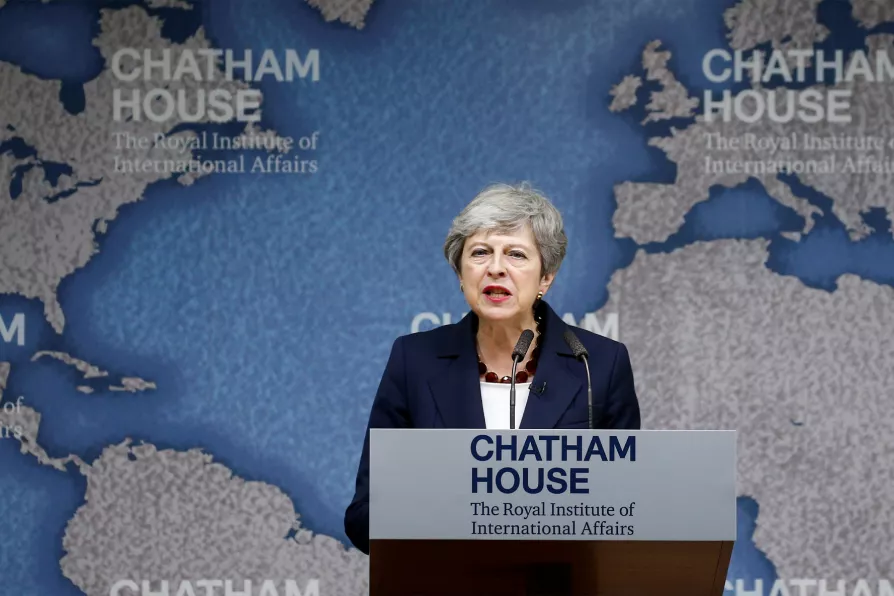As tens of thousands return to the streets for the first national Palestine march of 2026, this movement refuses to be sidelined or silenced, says PETER LEARY
THOUGH it hasn’t received any coverage in the mainstream media, new academic research raises serious questions about British foreign policy think tanks and their influence on policymaking and public debate.
Published in the peer-reviewed International Relations journal, the article from Dr Kjolv Egeland and Professor Benoit Pelopidas, both based at Sciences Po in Paris, starts from the premise that foreign policy think tanks are generally supportive of the current status quo when it comes to nuclear policy.
They note, for example, that “many if not most of the world’s top foreign policy think tanks have in recent years treated reformist diplomatic initiatives such as the promotion of nuclear no-first-use postures and the 2017 Treaty on the Prohibition of Nuclear Weapons with either indifference or hostility.”
What do funders want? Kjolv and Pelopidas set out four motives: to gain “access to informal networks and arenas where policy is formed and regulations discussed”; to burnish their reputations by associating with prestigious research institutions; to push particular narratives or policy ideas; and finally, some donors are interested in “controlling the discourse by fostering dependence and, by extension, self-censorship.”
Summarising their interview with a grant manager for a defence contractor, they note: “In addition to the branding motive, grants were provided in the hope that the recipients would think twice about saying or writing anything that would contradict the interests of the contractor.”
Similarly, a former grant manager for the ministry of defence of a nuclear-armed government commented: “If you don’t want to have a debate,” funding potential critics “is a good option.”
Unsurprisingly, Kjolv and Pelopidas conclude “‘stakeholding funding’ has real effects on intellectual freedom.”
Direct censorship is rare, they argue, though not unheard of. In contrast, self-censorship is more common.
“Knowing that existing and potential donors will have strong interests in certain topics or findings, analysts often adjust their language or conclusions or, more commonly, avoid certain topics altogether,” they explain.
“You would of course never propose [to analyse or comment on] something that was antithetical to the funder’s interests or worldview,” one think tank employee told them.
Another interviewee noted they had a significant degree of intellectual freedom at the think tank they worked at, but within “certain boundaries,” especially when it came to sensitive areas such as nuclear deterrence and disarmament.
More broadly, the authors conclude that the “most significant way in which funders shape foreign policy analysis is by helping to determine which milieus prosper and which topics and agendas are given attention.”
In short, who gets funded and who gets hired to write or speak in the first place. Donors are very unlikely, of course, to provide financial support to organisations and individuals whose views and politics fundamentally challenge their own interests.
Similar ideological constraints are built into the operation of corporate and state-affiliated media.
For example, last year Times journalist Tim Shipman tweeted: “Anyone in papers would tell you that editors, still less proprietors almost never tell anyone what to write. It’s a fantasy of the conspiracy minded… I decide what I write.”
Of course, this self-serving boast omits to mention the obvious fact that Shipman was hired by an editor at the paper, who themselves were hired by a senior editor, perhaps by the top editor. And the top editor was hired by the owner of the paper.
Fellow newshound Adam Bienkov blogged about Shipman’s claim: “He is likely telling the truth. Yet the reason that no such instructions need to be issued is because he is doing exactly what is expected of him.”
The three British think tanks have a symbiotic bond with the media — their staff are regularly cited in news reports, publish articles in the press and appear as objective experts on television news programmes.
“It galls me every time I see Chatham House, Rusi, IISS quoted by journalists as though they are independent think tanks,” British historian — and former Chatham House researcher — Mark Curtis recently told the Warrior Nation podcast. “Actually, they are part of the Establishment… they have very particular views on the world, and they are biased organisations that work for Establishment interests.”
Writing for Open Democracy in 2015, the academic David Wearing surveyed eleven articles Rusi researchers had recently written for the BBC news website.
Noting how many of the articles were written from the British state’s point of view, Wearing highlighted how inconvenient facts, like Britain’s role in the ongoing destruction of Yemen, were omitted or downplayed.
Analysing one article about Britain’s bombing of Iraq in 2014 by Rusi’s Shashank Joshi, Wearing notes: “So close is the author’s identification with the UK armed forces that three times — twice as ‘we’ and once as ‘our’ — Joshi refers to them in the first person.”
Returning to Egeland and Pelopidas’s research, for an academic journal article their conclusion is surprisingly strong: “Responsible scholars, journalists, and other members of the public should stop treating think tanks and university programmes that accept large donations from vested interests as research entities, and instead think of them as communications or public relations operations.”
The climate movement has had some success in raising awareness of how the opaque corporate funding of right-wing think tanks like the Global Warming Policy Foundation and Institute of Economic Affairs discredits them as independent commentators.
So while the research published by IISS, Chatham House and Rusi can sometimes be useful if read with a critical eye, it is imperative those working for a more humane British foreign policy also work to make sure these think tanks are treated as the pro-establishment organisations they are.
The article No Such Thing As A Free Donation? Research Funding And Conflicts Of Interest In Nuclear Weapons Policy Analysis is publicly available online — www.mstar.link/research.
Follow Ian on Twitter @IanJSinclair.


 Latest editorial
Latest editorial













